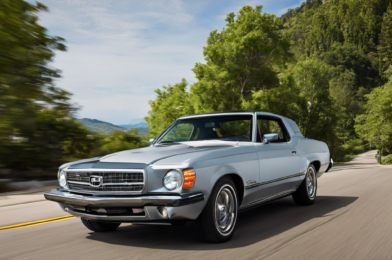The world of automotive maintenance can be a noisy one, and often, it can be challenging to determine whether those strange sounds emanating from your vehicle are cause for concern or merely part of its normal operation. To help you navigate this auditory landscape, we’ve put together a guide to decoding seven of the most common car noises and what they might be trying to tell you.
1. The High-Pitched Squeal
Imagine your car emitting a high-pitched squeal, much like fingernails on a chalkboard. This sound usually indicates that one of your belts—either the serpentine belt or the brake squealers—needs attention. If the serpentine belt is loose, it may slip, causing that ear-piercing noise. Fortunately, this is typically an easy fix, requiring only a quick adjustment or replacement of the belt.
2. The Grinding Noise
There are few sounds more cringe-worthy than the grinding of metal on metal. If you hear this coming from your brakes, it’s a clear sign that your brake pads are worn and need immediate replacement. Continued driving with worn brake pads can lead to further damage and more costly repairs, so it’s best to address this issue as soon as possible.
3. The Clicking Noise While Turning
As you turn the steering wheel, you may hear a clicking noise. This sound often indicates an issue with your constant-velocity (CV) joints, which are critical components in front-wheel-drive cars. When the protective grease inside the CV joints dries out or cracks, it can cause damage to the joints themselves, leading to a clicking noise. If left untreated, this problem can progress to a loud banging noise and potentially leave you stranded.
4.The Hissing Sound
Have you ever heard a hissing noise coming from your car? This sound is often indicative of a leak in your vehicle’s vacuum system or cooling system. A vacuum leak can affect your engine’s performance, while a cooling system leak can lead to overheating. It’s important to address hissing noises promptly to prevent further damage to your engine or cooling system.
5.The Ticking Noise.
A ticking noise coming from your engine could be caused by a variety of issues, ranging from low oil levels to a faulty fuel pump. In some cases, it may be as simple as adding more oil to your engine, but it could also indicate a more serious problem, such as a faulty valve train or a failing fuel pump. If you hear a ticking noise, it’s best to have a mechanic diagnose the issue promptly.
6.The Rumbling Roar
If your car starts to sound like a monster truck, it’s likely due to an issue with your exhaust system. A hole in the exhaust pipe or a failing muffler can cause your car to make a loud rumbling noise. While this may not impact the performance of your vehicle, it can be a safety hazard and is sure to annoy your neighbors. Get it checked out by a professional to restore peace and quiet.
7 .The Whistling Breeze
Whistling noises coming from your car often indicate an issue with air flow or pressure. This could be due to a loose window or door seal, a hole in the air filter box, or even a failing radiator fan. Whistling noises can vary in severity, so it’s important to have your car inspected to identify the root cause and prevent further issues down the line.
Keeping your car in tip-top shape involves paying attention to all your senses, including your hearing. By familiarizing yourself with these common car sounds and their potential causes, you’ll be better equipped to identify issues early on and take appropriate action. Remember, when it comes to car maintenance, it’s always better to be safe than sorry.
We hope this article has helped shed some light on those mysterious car noises. For more automotive insights and maintenance tips, stay tuned to our blog, and feel free to share your own car sound experiences in the comments below!
And as always, happy driving!

